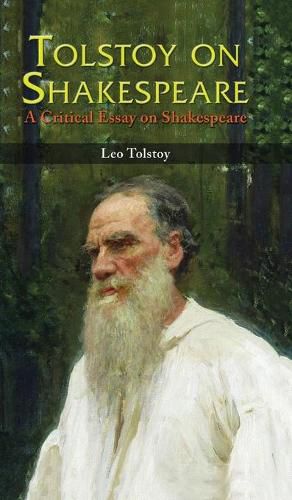Readings Newsletter
Become a Readings Member to make your shopping experience even easier.
Sign in or sign up for free!
You’re not far away from qualifying for FREE standard shipping within Australia
You’ve qualified for FREE standard shipping within Australia
The cart is loading…






This title is printed to order. This book may have been self-published. If so, we cannot guarantee the quality of the content. In the main most books will have gone through the editing process however some may not. We therefore suggest that you be aware of this before ordering this book. If in doubt check either the author or publisher’s details as we are unable to accept any returns unless they are faulty. Please contact us if you have any questions.
The author remembers the astonishment he felt when he first read Shakespeare. He expected to receive a powerful aesthetic pleasure, but having read, one after the other, works regarded as Shakespeare’s best: King Lear,
Romeo and Juliet,
Hamlet and Macbeth, not only did the author feel no delight, but he felt an irresistible repulsion and tedium, and doubted as to whether he was senseless in feeling works regarded as the summit of perfection by the whole of the civilized world to be trivial and positively bad, or whether the significance which this civilized world attributes to the works of Shakespeare was itself senseless. At the present time, before writing this preface, being desirous once more to test himself, the author, as an old man of seventy-five, again read the whole of Shakespeare, including the historical plays, the Henrys,
Troilus and Cressida, the Tempest,
Cymbeline, and he has felt, with even greater force, the same feelings, -this time, however, not of bewilderment, but of firm, indubitable conviction that the unquestionable glory of a great genius which Shakespeare enjoys, and which compels writers of his time to imitate him and readers and spectators to discover in him non-existent merits, -thereby distorting their aesthetic and ethical understanding, -is a great evil, as is every untruth.
$9.00 standard shipping within Australia
FREE standard shipping within Australia for orders over $100.00
Express & International shipping calculated at checkout
This title is printed to order. This book may have been self-published. If so, we cannot guarantee the quality of the content. In the main most books will have gone through the editing process however some may not. We therefore suggest that you be aware of this before ordering this book. If in doubt check either the author or publisher’s details as we are unable to accept any returns unless they are faulty. Please contact us if you have any questions.
The author remembers the astonishment he felt when he first read Shakespeare. He expected to receive a powerful aesthetic pleasure, but having read, one after the other, works regarded as Shakespeare’s best: King Lear,
Romeo and Juliet,
Hamlet and Macbeth, not only did the author feel no delight, but he felt an irresistible repulsion and tedium, and doubted as to whether he was senseless in feeling works regarded as the summit of perfection by the whole of the civilized world to be trivial and positively bad, or whether the significance which this civilized world attributes to the works of Shakespeare was itself senseless. At the present time, before writing this preface, being desirous once more to test himself, the author, as an old man of seventy-five, again read the whole of Shakespeare, including the historical plays, the Henrys,
Troilus and Cressida, the Tempest,
Cymbeline, and he has felt, with even greater force, the same feelings, -this time, however, not of bewilderment, but of firm, indubitable conviction that the unquestionable glory of a great genius which Shakespeare enjoys, and which compels writers of his time to imitate him and readers and spectators to discover in him non-existent merits, -thereby distorting their aesthetic and ethical understanding, -is a great evil, as is every untruth.